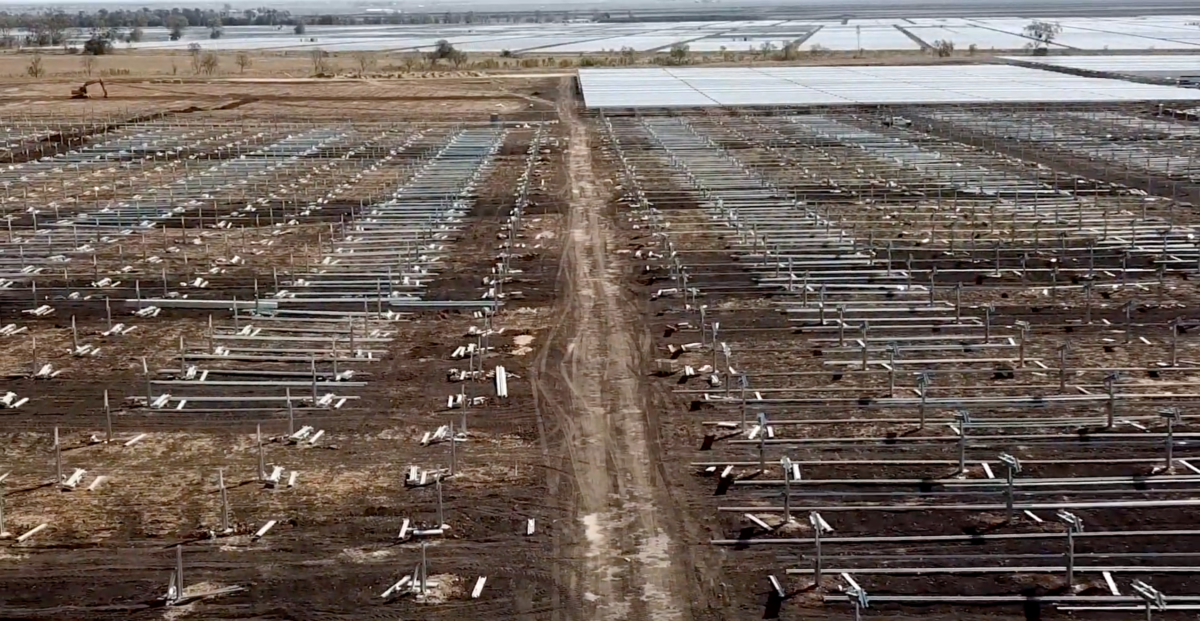Almost fritzed by the Queensland Palaszczuk Government’s solar installation rule change last May, then singed by bushfires in September, the 34.5 MW Brigalow Solar Farm at Yarranlea in still-connectible south-east Queensland last week began sending power to the grid.
Brigalow was first envisioned by UK-based developer Eco Energy World and sold following financial close to Impact Investment Group’s IIG Solar Asset Fund, in November 2018.
Via investments in IIG made by Future Super, the fossil-fuel-free superannuation fund, Brigalow is also part owned by Future Energy Artists (FEAT), the initiative of Heidi Lenffer, keyboard player in Australian alt-rock band Cloud Control.
FEAT was launched on World Environment Day in June last year, to enable musicians to invest in solar-energy assets — with the aim of offsetting the fossil fuels burned while touring, which for many bands is their primary source of income.
Among the first sign-ups to FEAT were Midnight Oil, Regurgitator and Peking Duk, and the 80-hectare Brigalow project is the first solar farm to benefit from their investment.
From rocky beginnings to an outcome that rocks
But Brigalow wasn’t destined to be an easy gig. Situated near Pittsworth, in the heart of Queensland’s Darling Downs, it became the flashpoint for the Labor Palaszczuk Government’s ill-considered “safety code” revision that suddenly required all mounting, locating, fixing or removing of solar panels on solar farms (with a total rated capacity of at least 100kW) to be performed by a licensed electrician, when these tasks had previously been carried out by less costly, and more available, unlicensed labourers.
Brigalow was under construction at the time and its managers, Maryrorough Solar, filed a claim in the Queensland Supreme Court arguing that the change in code would add some $2.6 million to the cost of the project.
The government had implemented the new requirement as a perceived necessary safety measure, in response to claims that unskilled workers were being employed to do electrical work on solar farms in Queensland.
The industry argued that labourers were employed only to carry and mount unconnected panels and that this work posed no danger of electrocution.
“It’s absurd,” said CEC Director of Energy Generation, Anna Freeman, at the time. “It would be virtually impossible to electrocute yourself by handling an unconnected panel.” Freeman went on to say that plugging in a toaster at home would pose a greater danger.
The state’s Supreme court found in Maryrorough Solar’s favour, declaring the rule change invalid — a decision that was upheld even on appeal — and Brigalow construction continued as planned.
Then in early September last year, infrastructure including conduits and solar panels awaiting installation at Brigalow were burned in one of three fires that threatened the property at a time when more than 60 blazes burning in the state provided a stark reminder of the need to reduce emissions and hose down global warming.
Forged through fire
By November, however, Lenffer was elatedly striding through former sorghum fields ahead of serried rows of panels, saying in a promotional video produced by FEAT, “It’s easy to feel overwhelmed by the climate crisis, or that nothing you do will make a difference …”
But, said Lenffer to investors current and future, “Look at what your actions have already achieved. At 35 MW, Brigalow will power over 11,000 homes. It’s amazing what you can get done with the small actions of many.”
Successful first generation from Brigalow is a reminder of the myriad hurdles the solar-energy and renewables industry as a whole have overcome in recent times, the powerful reasons for redoubling industry efforts, and the passion of investors from every walk of life to contribute to a clean-energy future.
This content is protected by copyright and may not be reused. If you want to cooperate with us and would like to reuse some of our content, please contact: editors@pv-magazine.com.









By submitting this form you agree to pv magazine using your data for the purposes of publishing your comment.
Your personal data will only be disclosed or otherwise transmitted to third parties for the purposes of spam filtering or if this is necessary for technical maintenance of the website. Any other transfer to third parties will not take place unless this is justified on the basis of applicable data protection regulations or if pv magazine is legally obliged to do so.
You may revoke this consent at any time with effect for the future, in which case your personal data will be deleted immediately. Otherwise, your data will be deleted if pv magazine has processed your request or the purpose of data storage is fulfilled.
Further information on data privacy can be found in our Data Protection Policy.